

What are Cognitive Skills and Abilities? By: Dr.
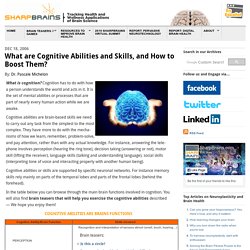
Pascale Michelon What is cognition? Cognition has to do with how a person understands the world and acts in it. It is the set of mental abilities or processes that are part of nearly every human action while we are awake. Cognitive abilities are brain-based skills we need to carry out any task from the simplest to the most complex. Cognitive abilities or skills are supported by specific neuronal networks. In the table below you can browse through the main brain functions involved in cognition. With age, some cognitive abilities tend to decline, especially the so-called executive functions, and those cognitive abilities that are not used regularly. Cognitive Skills: What They Are and Why They Are Important. 29 Nov Cognitive Skills: What They Are and Why They Are Important The word “cognition” is defined as “the act or process of knowing”.
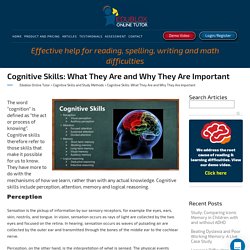
Cognitive skills therefore refer to those skills that make it possible for us to know. They have more to do with the mechanisms of how we learn, rather than with any actual knowledge. LearningRx Brain Training Center. Cognitive skills are the core skills your brain uses to think, read, learn, remember, reason, and pay attention.
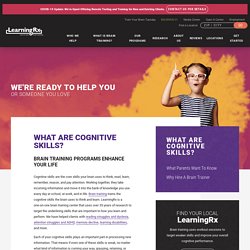
Working together, they take incoming information and move it into the bank of knowledge you use every day at school, at work, and in life. Brain training trains the cognitive skills the brain uses to think and learn. LearningRx is a one-on-one brain training center that uses over 35 years of research to target the underlining skills that are important to how you learn and perform. What Are Cognitive Skills and How Do They Work? - A BrainFit Resorts Production. Summary. Cognitive Impairment. Cognitive impairment can cause problems with a person’s thinking, communication, understanding or memory.
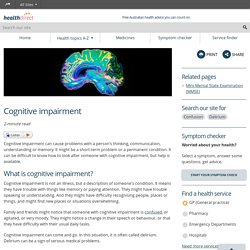
It might be a short-term problem or a permanent condition. It can be difficult to know how to look after someone with cognitive impairment, but help is available. Cognitive Problem Symptoms, Causes and Effects - PsychGuides.com. Cognitive disorders often begin subtly but progress until they significantly impede the affected individual’s quality of life.
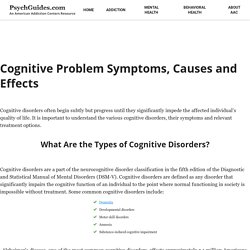
It is important to understand the various cognitive disorders, their symptoms and relevant treatment options. What Are the Types of Cognitive Disorders? Cognitive disorders are a part of the neurocognitive disorder classification in the fifth edition of the Diagnostic and Statistical Manual of Mental Disorders (DSM-V). Cognitive disorders are defined as any disorder that significantly impairs the cognitive function of an individual to the point where normal functioning in society is impossible without treatment. Age-Associated Cognitive Decline. We use cookies to enhance your experience on our website.By continuing to use our website, you are agreeing to our use of cookies.
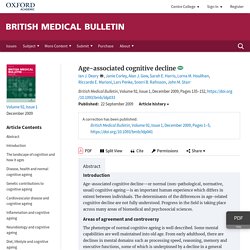
You can change your cookie settings at any time. <a href=" Find out more</a> Skip to Main Content Search Close Advanced Search Search Menu Article Navigation Volume 92 Issue 1 December 2009 Article Contents. The Impact of Age on Cognition. Summary. WHY & HOW: Exercise Can Improve Brain Function in Older Adults. New research conducted at the University of Kansas Medical Center indicates that older adults can improve brain function by raising their fitness level.
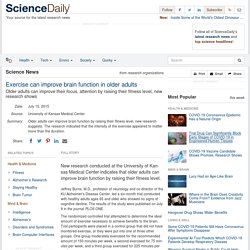
Jeffrey Burns, M.D., professor of neurology and co-director of the KU Alzheimer's Disease Center, led a six-month trial conducted with healthy adults ages 65 and older who showed no signs of cognitive decline. The results of the study were published on July 9 in the journal PLOS ONE. The randomized controlled trial attempted to determine the ideal amount of exercise necessary to achieve benefits to the brain. Trial participants were placed in a control group that did not have monitored exercise, or they were put into one of three other groups. One group moderately exercised for the recommended amount of 150 minutes per week, a second exercised for 75 minutes per week, and a third group exercised for 225 minutes per week.
"Basically, the more exercise you did, the more benefit to the brain you saw," Burns said. WHY & HOW: Activity Energy Expenditure and Incident Cognitive Impairment in Older Adults. Background Studies suggest that physically active people have reduced risk of incident cognitive impairment in late life.
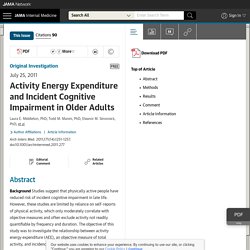
However, these studies are limited by reliance on self-reports of physical activity, which only moderately correlate with objective measures and often exclude activity not readily quantifiable by frequency and duration. The objective of this study was to investigate the relationship between activity energy expenditure (AEE), an objective measure of total activity, and incidence of cognitive impairment.
Methods We calculated AEE as 90% of total energy expenditure (assessed during 2 weeks using doubly labeled water) minus resting metabolic rate (measured using indirect calorimetry) in 197 men and women (mean age, 74.8 years) who were free of mobility and cognitive impairments at study baseline (1998-1999). Cognitive function was assessed at baseline and 2 or 5 years later using the Modified Mini-Mental State Examination.
Resting metabolic rate protocol Weir JB. WHY & HOW: A Life-Long Approach to Physical Activity for Brain Health. Introduction It is predicted that by 2050, the global population of older people, in both developed and developing countries, will more than double, reaching nearly 2.1 billion (United Nations Department of Economic and Social Affairs Population Division, 2015).
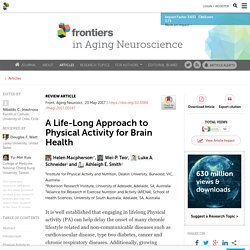
The number of people aged 80 years or over is increasing at an even faster rate, resulting in a growing number of indivduals living for longer with significant disability, reduced quality of life and multiple chronic conditions (Prince et al., 2015). As a consequence of rapid population aging, there is a rising prevalence of age-related neurodegenerative disorders including Alzheimer’s disease (AD) and Parkinson’s disease (PD; Reitz et al., 2011; Wirdefeldt et al., 2011). To reduce the burden of disease attributable to these disorders, attention should be paid to optimizing early life brain development to promote life-long neuronal enrichment, and maximize neuroplasticity and cognition (Prince et al., 2015). Future Challenges. EXAMPLE: 20 Min Exercise for Seniors, Elderly, & Older People - Seated Chair Exercise Senior Workout Routines. Summary. WHY & HOW: The Effects of Cognitive Training for Elderly. Introduction Aging is often associated with specific changes in cognitive functions, including a decline in attention processes, memory, and visuospatial and executive abilities.1 In particular, some studies found that in older people with cognitive decline, such as mild cognitive impairment (MCI), impairment in measures of acquisition, delayed recall, associative memory, face–name pairings, naming, visuospatial memory tasks, and attention deficits strongly predicted conversion to Alzheimer's disease (AD).2,3 Nevertheless, aging, per se, is not inevitably linked to cognitive decline.
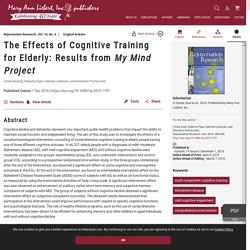
Cognitive training is considered an effective nonpharmacological intervention for many reasons. WHY & HOW: Exergames: Neuroplastic Hypothesis About Cognitive Improvement & Biological Effects on Physical Function of Institutionalized Older Persons. Exergames: neuroplastic hypothesis about cognitive improvement and biological effects on physical function of institutionalized older persons Correspondence Address:Renato Sobral Monteiro-JuniorPhysical Education and Sport Department of the Universidade Estadual de Montes Claros, Minas Gerais, Brazil; Post Graduation Program (PhD) in Medicine (Neurology-Neuroscience), Universidade Federal Fluminense, Niterói, Brazil; Neuroscience Laboratory of Exercise, Universidade Federal do Rio de Janeiro, Rio de Janeiro, Brazil Source of Support: None, Conflict of Interest: None Exergames can be considered a dual task because the games are performed by a man-videogame interface, requiring cognitive and motor functions simultaneously.
Although the literature has shown improvements of cognitive and physical functions due to exergames, the intrinsic mechanisms involved in these functional changes have still not been elucidated. [Figure 1], [Figure 2] WHY & HOW: Cognitive Reserve in Ageing and Alzheimer's Disease. EXAMPLE: 3 Easy Memory Games for Seniors. Summary. WHY & HOW: Engagement in Social Activities and Progression from Mild to Severe Cognitive Impairment. WHY & HOW: Which Type of Social Activities May Reduce Cognitive Decline in The Elderly? Study design and participants The present study employed a secondary analysis approach using data from the Korean Longitudinal Study of Aging (KLoSA), an ongoing panel survey examining the socioeconomic, physical, and psychological aspects of aging among community-dwelling Koreans 45 years of age or older.
The sample was stratified based on age and sex; to ensure national representation, participants were selected randomly using a multistage, stratified, probability sampling design from household units selected according to geographical area, including both urban and rural areas. WHY & HOW: Change in Stress and Social Support as Predictors of Cognitive Decline in Older Adults with and without Depression. EXAMPLE: Staying Social: Activities for the Elderly.
Summary.